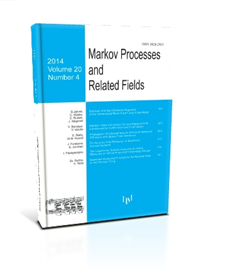Convergence in Total Variation of an Affine Random Recursion in $[0,p)^{k}$ to a Uniform Random Vector
C. Asci
2013, v.19, Issue 1, 125-140
ABSTRACT
We study the rate of convergence of the Markov chain $\math {X}_{n+1}=A\math {X}_{n}+\math {B}_{n}$ (mod $p$), where $A$ is an integer matrix with nonzero eigenvalues, $p$ is real and positive, and $\{\math {B}_{n}\}$ is a sequence of independent and identically distributed real random vectors. With some hypotheses on the law of $\math {B}_{n}$, the sequence $\{\math {X}_{n}\}$ converges to a random vector uniformly distributed in $[0,p)^{k}$. The rate of convergence is geometric and depends on $A$, $p$, $k$, and the distribution of $\math {B}_{n}$. Moreover, if $A$ has an eigenvalue that is a root of $1$, then $n = O (p^{2})$ steps are necessary to have $\math {X}_{n}$ sampling from a nearly uniform law.
Keywords: continuous Markov chains,uniform ergodicity,generating randomvectors,rate of convergence
COMMENTS
Please log in or register to leave a comment

